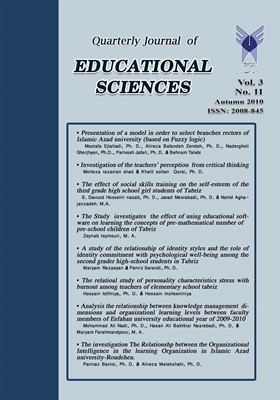The effect of social skills training on the self-esteem of the third grader female high school students in Tabriz
Subject Areas : Educational PsychologyS. Davood Hosseini nasab 1 , Javad Mesrabadi 2 , Nahid Aghajanzadeh 3
1 - استاد دانشگاه آزاد اسلامی واحد تبریز، گروه علومتربیتی، تبریز، ایران.
2 - استادیار دانشگاه تربیت معلم آذربایجان
3 - کارشناسارشد روانشناسی عمومی
Keywords: Students, Social skills training, Self–esteem,
Abstract :
The objective of this research was to pinpoint the effect of social skills training on the self-esteem of the third grader female high-school students in Tabriz. The statisticalpopulation was 19425students in 65 classes out of which one class (34 students) as experimental group and another class (22 students) as control group through cluster random sampling were chosen as sample size. Both groups were asked to fill in the Cooper Smith's self-esteem questionnaire as the initial pre-test. Next the experimental group was asked to take part in one hour, eight session class for one month on living skills(sympathy, decision making, problem solving, and self expression). The control group had their regular daily program. Both groups were asked to take the post-test. The data were analyzed through SPSS software. The results showed that training social skills has a significant effect on general, educational and social self-esteem. There was increase in personal and family esteem, but they were not significant.
آیتی، محسن(1375). اثر نوارهای ویدئویی آموزش درس ریاضی(کتاب فیلم) در پیشرفت تحصیلی دانشآموزان. پایاننامه دانشگاهعلامه طباطبایی، به راهنمایی داریوش نوزری.
بشیری، علی(1386). بررسی تأثیر استفاده از نرمافزارهای آموزشی فیزیک سال سوم دبیرستان بر پیشرفت تحصیلی و تعامل دانشآموزان در کلاس. پایاننامه دانشگاه تربیت مدرس، به راهنمایی احد یاری راد.
جاریانی، احمد(1387). تأثیر فناوری ارتباطات و اطلاعات بر برنامهریزی درسی. دفتر برنامهریزی و تألیف آموزش فنیوحرفهای و کاردانش. صفحه 16.
حجفروش، ابراهیم و اورنگی، مهدی(1388). بررسی نتایج کاربرد تحقیقات فناوریاطلاعات و ارتباطات در دبیرستانهای شهر تهران. فصلنامه نوآوریهای علمی- پژوهشی. شماره10. صفحه11.
خلیلی مهدایرجی، مریم(1384). بررسی مفاهیم ریاضی در دوره پیش از دبستان و تعیین ارائه مناسب آن از دیدگاه مربیان مراکز پیشدبستانی شهر تهران. پایاننامه دانشگاه علامه طباطبایی، به راهنمایی فرخنده مفیدی.
زمانی، علی(1386). فناوری اطلاعات و ارتباطات و پرورش مهارتهای حرفهای. ماهنامه انجمن انفورماتیک ایران، شماره16، صفحه 196.
شعبانی، حسن(1384). مهارتهای آموزش و پرورش. سازمان مطالعه و تدوینعلوم دانشگاهی (سمت). صفحه 43.
شیخ زاده، ناهید (1385). طراحی نرمافزار آموزشی بر اساس رویکرد سازنده گراییو سنجش میزان اثر بخشی آن. فصلنامه نوآوری آموزشی، شماره 1، سال چهارم.
عباسی، عبدالله(1383). بررسی تأثیر نوارهای آموزشی ریاضی بر پیشرفت تحصیلی دانشآموزان ابتدایی. پایاننامه کارشناسی ارشد. صفحه 102.
کاستلر، م(1384). ظهور شبکهای، ترجمه احمد علیقلیان. تهران: انتشاراتطرح نو. [جلد اول].صفحه 15.
کلینگ، د(1388). آموزش برای قرن بیستویکم، ترجمه سیدفرهاد افتخاری،تهران: انتشارات عابد. صفحه102.
محمدی، علی و قربانزاده، صمد(1388). بررسی نمره استقبال معلمان از نوآوریهایآموزشی در تدریس، نشریه علومتربیتی، شماره 1-2، صفحه 15.
مفیدی، فرخنده(1386). برنامه آموزش و پرورش پیش از دبستان.انتشارات سمت. صفحه 46.
میرحسنی، سیامک و محمودی، نیما(1386). تأثیر رایانه در فراگیری نگارشزبان انگلیسی، ژورنال آموزش زبان خارجی، دوره بیست و یکم، شماره3.
Becker, h., (1998). How computers are used in United states school. Journal of educationcomputing research, v.4, P. 241.
Clark (2008). The effectiveness of technology in schools. Journal of Career and Technical Education No, P.25.
Dwyer. p., (1998). Teaching and Learning with Technology. http://www.itsn.ac.uk.
John, T., (2005). In Resting in prescool. Evidence continiue to indicate the powerfull effects of high quality preschool programs on children later academic success. Journal of Leadership.
Hadda.w., and jurichts. (2000). ICT for education, potentil and potency. available at: http:www.techkwnologia.org.
Means and Olson. (1996). Computers and the thought producing self of the young child. British Journal of Educational Technology, p.31
Post holm. (2006). Integrating technology in to the classroom. Information Technology in erucation.
Schofield.W., (1995). Evaluating what really mattersim. Computer based education. http://www.edu


